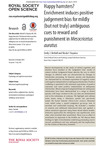Please use this identifier to cite or link to this item:
http://lib.hpu.edu.vn/handle/123456789/22378Full metadata record
| DC Field | Value | Language |
|---|---|---|
| dc.contributor.author | Bethell, Emily J. | en_US |
| dc.contributor.author | Koyama, Nicola F. | en_US |
| dc.date.accessioned | 2016-07-30T01:24:41Z | |
| dc.date.available | 2016-07-30T01:24:41Z | |
| dc.date.issued | 2015 | en_US |
| dc.identifier.other | HPU4160483 | en_US |
| dc.identifier.uri | https://lib.hpu.edu.vn/handle/123456789/22378 | en_US |
| dc.description.abstract | Recent developments in the study of animal cognition and emotion have resulted in the ‘judgement bias’ model of animal welfare. Judgement biases describe the way in which changes in affective state are characterized by changes in information processing. In humans, anxiety and depression are characterized by increased expectation of negative events and negative interpretation of ambiguous information. Positive wellbeing is associated with enhanced expectation of positive outcomes and more positive interpretation of ambiguous information. | en_US |
| dc.format.extent | 17 p. | en_US |
| dc.format.mimetype | application/pdf | en_US |
| dc.language.iso | en | en_US |
| dc.subject | Behaviour | en_US |
| dc.subject | Cognition | en_US |
| dc.subject | Psychology | en_US |
| dc.subject | Animal welfare | en_US |
| dc.subject | Judgement bias | en_US |
| dc.subject | Environmental enrichment | en_US |
| dc.subject | Psychological wellbeing | en_US |
| dc.type | Article | en_US |
| dc.size | 584KB | en_US |
| dc.department | Education | en_US |
| Appears in Collections: | Education | |
Files in This Item:
| File | Description | Size | Format | |
|---|---|---|---|---|
| 0366_Happyhamsters.pdf Restricted Access | 584.64 kB | Adobe PDF |  View/Open Request a copy |
Items in DSpace are protected by copyright, with all rights reserved, unless otherwise indicated.
